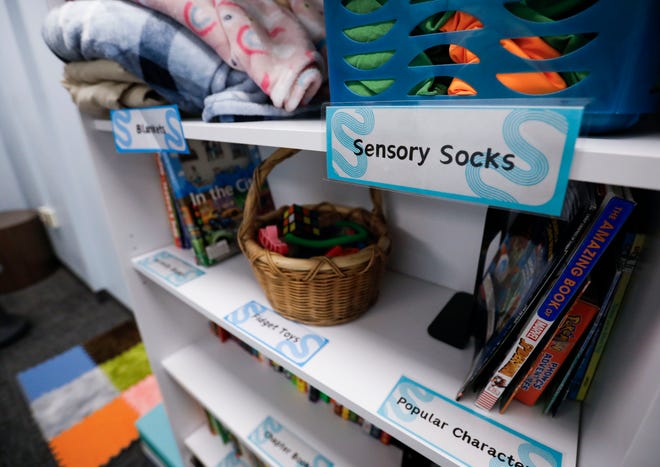“I don’t want my child to die.” The words escaped my trembling lips during a recent meeting at my son’s school. I ended up leaving the meeting in tears.
My son will be starting high school in the fall, and while it may be a welcome change for some, it worries me because he is black and Mexican and looks like a typical teenager, which has led to frustration and aggression from people who don’t know him.
His behavior could be perceived as a threat and he could face violence from the authorities. This isn’t just a concern: Children like my son are seven times more likely to encounter police than “neurotypical” individuals.
Here’s one example of how quickly and horribly things can go wrong: In March, sheriff’s deputies in San Bernardino County, California, responded to a 911 call from the mother of 15-year-old Ryan Gaynor. Ryan, who was diagnosed with autism, had reportedly had a seizure and approached deputies with large gardening tools. Two deputies shot and killed the boy.
My military family’s life took an unexpected turn while we were stationed in Heidelberg, Germany in 2012. That year, my oldest son was diagnosed with autism, sensory processing disorder, and later with attention deficit hyperactivity disorder and intermittent explosive disorder.
This diagnosis marked the beginning of a journey full of challenges, but also a moment of resilience and growth, and I wanted to get him help as soon as possible.
I refuse to downplay my disability. The rejections have piled up ever since I disclosed my disability on a job application. The ADA is failing us.
Early intervention services became a staple part of our family’s daily life, with our son receiving multiple therapies every day. At the same time, he also received an Individualized Education Plan (IEP), a roadmap that would guide his learning journey into adulthood.
Little did we know that our journey would take us across continents and encounter unexpected obstacles along the way.
My son was refused admission to school.

In 2019, military orders sent us to MacDill Air Force Base in Tampa, Florida. Excited about our new life, I tried to enroll my two school-age children in Tinker Elementary, the public school on base. But that seemingly routine task quickly became a bureaucratic mess.
After registering, the administrator informed them that their daughter would be attending school the next day. However, the same news was not given to them regarding their son’s registration. They were told that their son could not be enrolled in the same elementary school as his sister due to his disability, and the school administrators claimed that they did not have the resources to accommodate their son’s special needs.
I was shocked and confused. My son had never been refused admission to a school when our family moved. I was informed that he would be sent to a different school because of his disability.
How do you raise a child with autism? Here’s what I’ve learned as the mother of a beautiful son.
Seeking guidance, I contacted the Special Family Member Programs office at MacDill Air Force Base, seeking support and reassurance that a mistake might have been made. What I encountered was disheartening: I was directed to take my concerns to the Army’s EFMP office, which was over six hours away in another state.
I was completely shocked by the surreal nature of this situation: How could military families in dire need of assistance be left behind with no local support?
Children have the right to a safe and equal education
The placement of students with disabilities in Hillsborough County, Florida, seemed to me to be inherently flawed. Rather than integrating students like my son into local district schools, decisions were made based on the needs of the district, isolating them from their peers.
The impact was devastating: our son was denied the opportunity to attend school with his siblings and neighbors, depriving him of important social interaction and stability.
To make matters worse, the school district did not comprehensively review his IEP, resulting in an inappropriate educational placement that lacked the individualized supports he needed.
Reflecting on my experience, I cannot help but advocate for change. Installation school liaison officers must be equipped with the knowledge and resources to address the complex issues families like mine face. They should be our allies, navigating the intersection of local education laws and military policy to ensure that all children receive fair treatment.

Military families serving around the world deserve understanding and support, not bureaucratic roadblocks. It’s time for systemic change, where the needs of special families are prioritized, not ignored, and we foster communities where all children can thrive, no matter the challenges.
Without adequate support services and well-trained School Resource Officers and law enforcement, my son’s life is at risk. He has a right to safety and an equal education.
Mara Bautista is a military columnist for USA TODAY Opinion.

